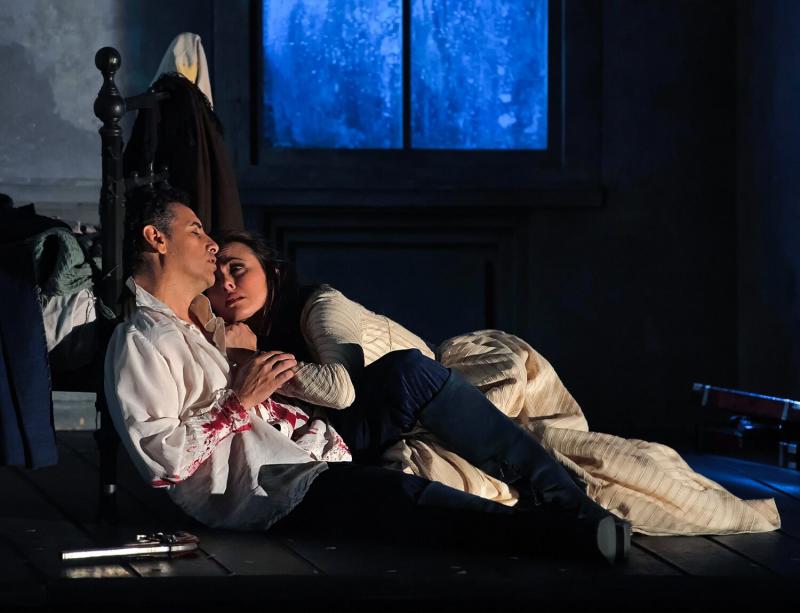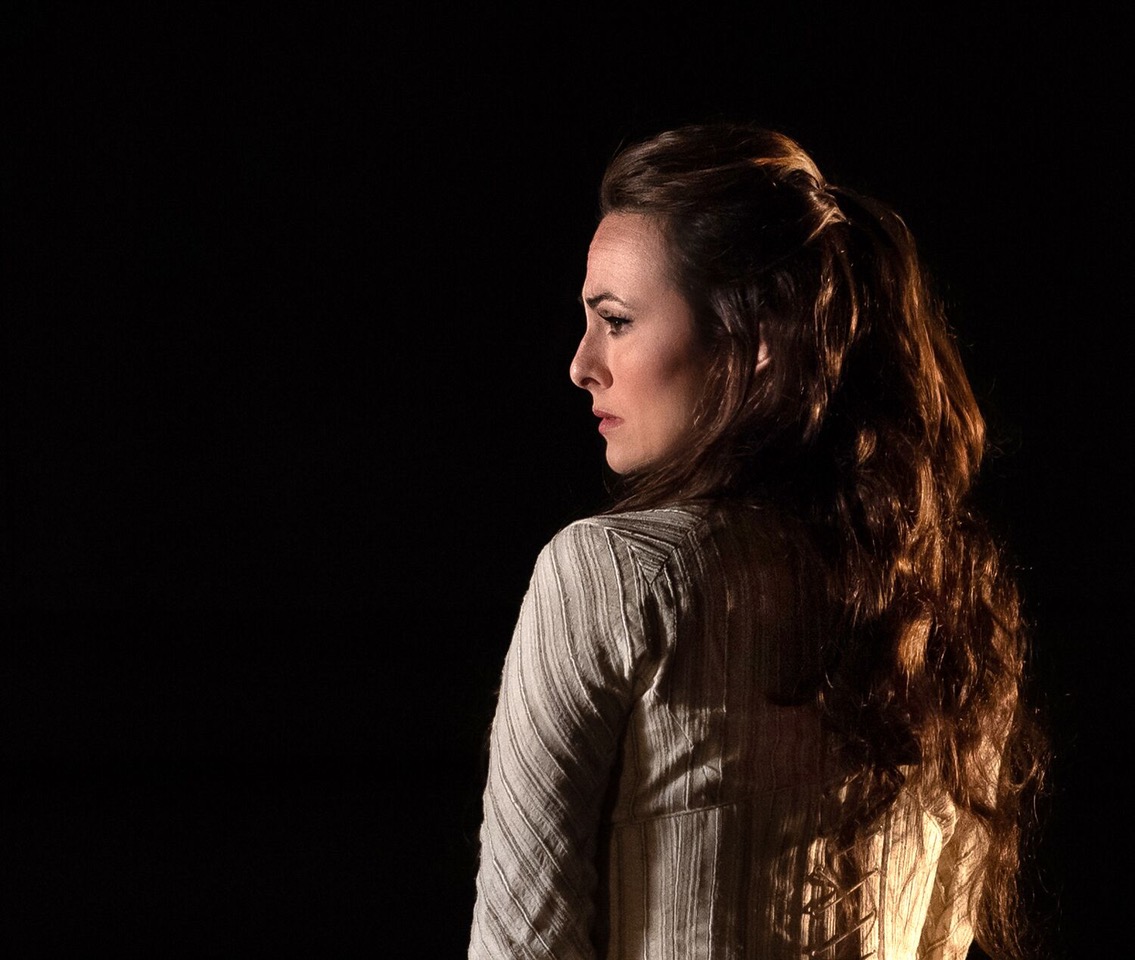Werther, Royal Opera review - shadows and sunsets from an unreconstructed romantic | reviews, news & interviews
Werther, Royal Opera review - shadows and sunsets from an unreconstructed romantic
Werther, Royal Opera review - shadows and sunsets from an unreconstructed romantic
Massenet's opera shines bright, notwithstanding a slightly clunky hero

Goethe’s Die Leiden des junges Werthers (The Sorrows of Young Werther) was a vital spark in the ignition of the German romantic movement. The story of a young man driven to kill himself for love of a woman, Charlotte, who loves him but marries someone else out of duty to her family, it was first published in 1774. It triggered a fever across Europe ranging from fashion trends (Werther wears blue with a yellow waistcoat) to a spate of copycat suicides.
Benoït Jacquot’s Royal Opera production, here revived by Andrew Sinclair, is now 15 years old, but it ain’t broke and doesn’t need fixing. Large, striking sets capture lighting effects by Charles Edwards that complement the dusky, slanting sunsets of Massenet’s score; there’s a touching naturalism that fleshes out some of the work’s patchy characterisation; and plenty of stillness that allows the music to articulate unspoken emotion.  The American mezzo-soprano Isabel Leonard, in her house debut as Charlotte (pictured above), was the evening’s highlight, with an effortless range of colour, soaring tone and ability wholly to inhabit the character’s dilemmas. If only the same could be said for Juan Diego Flórez as Werther. The star Peruvian tenor’s voice has changed over time and the old silken finesse has acquired a harder edge; there’s more projection, perhaps, but less beauty, and he is unfortunately not the world’s most natural actor of tormented souls - though his show-stopper did stop the show.
The American mezzo-soprano Isabel Leonard, in her house debut as Charlotte (pictured above), was the evening’s highlight, with an effortless range of colour, soaring tone and ability wholly to inhabit the character’s dilemmas. If only the same could be said for Juan Diego Flórez as Werther. The star Peruvian tenor’s voice has changed over time and the old silken finesse has acquired a harder edge; there’s more projection, perhaps, but less beauty, and he is unfortunately not the world’s most natural actor of tormented souls - though his show-stopper did stop the show.
Fine casting in the smaller roles rather showed him up, notably the relish with which Alistair Miles as a larger-than-life Bailli (the Mayor and paterfamilias) coached his group of younger children in their distinctly unseasonal carol. Heather Engebretson, petite and with a beautifully bright soprano voice, made Sophie, Charlotte’s 15-year-old sister, into a wonderfully believable picture of an adolescent girl trying to grow up. As Albert, the man Charlotte marries to please her late mother, the luminous baritone voice of Jacques Imbrailo was luxury casting for a paper-thin role that doesn’t really deserve him.  The subtle and imaginative orchestration is one of the opera’s chief glories - Werther’s otherness is defined by music rich in cello and harp, contrasting with the woodwind for Albert; and Charlotte’s Act III aria, revealing the depth of her unspoken sorrows, is enriched to fabulous effect by a solo saxophone. The Royal Opera House Orchestra was in fine form under Edward Gardner, whose masterly pacing of the storytelling and instinct for changing colours and energies made this long work fly by, despite occasionally drowning out Flórez.
The subtle and imaginative orchestration is one of the opera’s chief glories - Werther’s otherness is defined by music rich in cello and harp, contrasting with the woodwind for Albert; and Charlotte’s Act III aria, revealing the depth of her unspoken sorrows, is enriched to fabulous effect by a solo saxophone. The Royal Opera House Orchestra was in fine form under Edward Gardner, whose masterly pacing of the storytelling and instinct for changing colours and energies made this long work fly by, despite occasionally drowning out Flórez.
The litmus test for a good Werther, though, is the state of your mascara at the end. Mine emerged intact.
rating
Explore topics
Share this article
Add comment
The future of Arts Journalism
You can stop theartsdesk.com closing!
We urgently need financing to survive. Our fundraising drive has thus far raised £49,000 but we need to reach £100,000 or we will be forced to close. Please contribute here: https://gofund.me/c3f6033d
And if you can forward this information to anyone who might assist, we’d be grateful.

Subscribe to theartsdesk.com
Thank you for continuing to read our work on theartsdesk.com. For unlimited access to every article in its entirety, including our archive of more than 15,000 pieces, we're asking for £5 per month or £40 per year. We feel it's a very good deal, and hope you do too.
To take a subscription now simply click here.
And if you're looking for that extra gift for a friend or family member, why not treat them to a theartsdesk.com gift subscription?
more Opera
 Ariodante, Opéra Garnier, Paris review - a blast of Baroque beauty
A near-perfect night at the opera
Ariodante, Opéra Garnier, Paris review - a blast of Baroque beauty
A near-perfect night at the opera
 Cinderella/La Cenerentola, English National Opera review - the truth behind the tinsel
Appealing performances cut through hyperactive stagecraft
Cinderella/La Cenerentola, English National Opera review - the truth behind the tinsel
Appealing performances cut through hyperactive stagecraft
 Tosca, Royal Opera review - Ailyn Pérez steps in as the most vivid of divas
Jakub Hrůša’s multicoloured Puccini last night found a soprano to match
Tosca, Royal Opera review - Ailyn Pérez steps in as the most vivid of divas
Jakub Hrůša’s multicoloured Puccini last night found a soprano to match
 Tosca, Welsh National Opera review - a great company reduced to brilliance
The old warhorse made special by the basics
Tosca, Welsh National Opera review - a great company reduced to brilliance
The old warhorse made special by the basics
 BBC Proms: The Marriage of Figaro, Glyndebourne Festival review - merriment and menace
Strong Proms transfer for a robust and affecting show
BBC Proms: The Marriage of Figaro, Glyndebourne Festival review - merriment and menace
Strong Proms transfer for a robust and affecting show
 BBC Proms: Suor Angelica, LSO, Pappano review - earthly passion, heavenly grief
A Sister to remember blesses Puccini's convent tragedy
BBC Proms: Suor Angelica, LSO, Pappano review - earthly passion, heavenly grief
A Sister to remember blesses Puccini's convent tragedy
 Orpheus and Eurydice, Opera Queensland/SCO, Edinburgh International Festival 2025 review - dazzling, but distracting
Eye-popping acrobatics don’t always assist in Gluck’s quest for operatic truth
Orpheus and Eurydice, Opera Queensland/SCO, Edinburgh International Festival 2025 review - dazzling, but distracting
Eye-popping acrobatics don’t always assist in Gluck’s quest for operatic truth
 MARS, Irish National Opera review - silly space oddity with fun stretches
Cast, orchestra and production give Jennifer Walshe’s bold collage their all
MARS, Irish National Opera review - silly space oddity with fun stretches
Cast, orchestra and production give Jennifer Walshe’s bold collage their all
 Káťa Kabanová, Glyndebourne review - emotional concentration in a salle modulable
Janáček superbly done through or in spite of the symbolism
Káťa Kabanová, Glyndebourne review - emotional concentration in a salle modulable
Janáček superbly done through or in spite of the symbolism
 Buxton International Festival 2025 review - a lavish offering of smaller-scale work
Allison Cook stands out in a fascinating integrated double bill of Bernstein and Poulenc
Buxton International Festival 2025 review - a lavish offering of smaller-scale work
Allison Cook stands out in a fascinating integrated double bill of Bernstein and Poulenc
 Tosca, Clonter Opera review - beauty and integrity in miniature
Happy surprises and a convincing interpretation of Puccini for today
Tosca, Clonter Opera review - beauty and integrity in miniature
Happy surprises and a convincing interpretation of Puccini for today
 Hamlet, Buxton International Festival review - how to re-imagine re-imagined Shakespeare
Music comes first in very 19th century, very Romantic, very French operatic creation
Hamlet, Buxton International Festival review - how to re-imagine re-imagined Shakespeare
Music comes first in very 19th century, very Romantic, very French operatic creation

Comments
Absolutely agree with Jessica